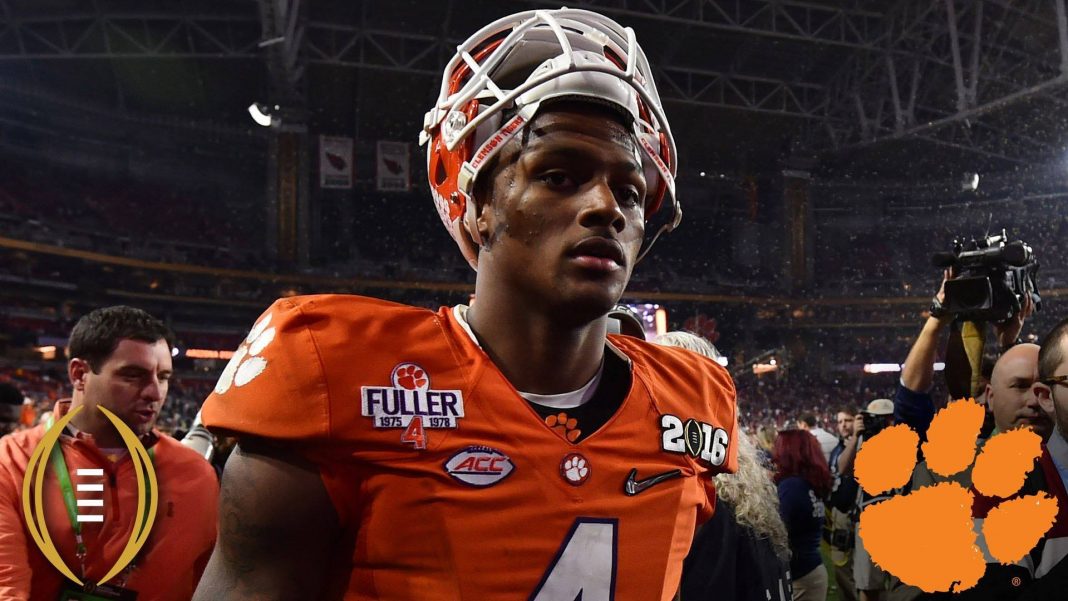
Everyone has their idea of who should win the Heisman Trophy, and there’s usually quite the list of those that truly deserve it. DeShaun Watson was easily one of those on the ‘most deserved’ list, and here’s the breakdown of why he deserved more than most.
Recently, the Heisman Trophy has been described as an award for the Most Valuable Quarterback in college football, and for good reason. Entering the 2015 season, QBs had won the last five Heismans, eight of the last nine and 13 of the last 15 (and that’s if you include Reggie Bush’s vacated trophy).
That’s mainly because quarterbacks are typically the most important player for successful college teams, especially with the rise of dual-threat gunslingers who can cause defenses headaches with both their arm and legs.
DeShaun Watson checked all the boxes predetermined by the five most recent winners, and in some cases, surpassed their accomplishments. He racked up 3,517 passing yards in the regular season, more than Cam Newton and Johnny Manziel. He had more regular season rushing yards (887) than Robert Griffin III and Marcus Mariota.
And perhaps most importantly, the sophomore led the Clemson Tigers to a dominant 13-0 regular season and an undisputed No. 1 ranking heading into bowl season. That’s something Manziel, Griffin and Mariota never accomplished.
And yet, Watson finished a distant third in Heisman voting behind Derrick Henry and Christian McCaffrey.
This is not to take away from Henry, whose rushing yardage total (1,986) was the sixth-highest in Heisman history. However, as Heisman.com noted, he had played 13 games while the rest of the top 10 seasons came in 10, 11 or 12 games.
And while McCaffrey’s 3,496 all-purpose yards led the nation and broke the all-time FBS single-season mark of 3,250 set by Barry Sanders, McCaffrey set his mark in 13 games after Sanders did so in 11. It’s also worth questioning whether compiling more than 1,000 yards on kick returns with only one touchdown in 36 tries merits placing McCaffrey over his competitors in the Heisman hierarchy.
Watson, meanwhile, equaled or bested the significant marks set by contemporary Heisman-winning quarterbacks. And he was at his best in Clemson’s biggest moments.
In the team’s first big test against Notre Dame, he played a part in each of the Tigers’ three touchdowns in a 24-22 nailbiter. A 21-yard scamper shortly after halftime staked them out to a 21-3 lead, which they’d end up needing every bit of.
Two weeks later, the Tigers offense was confronted by what would end up as the NCAA‘s best defense by yards allowed in Boston College. Watson responded with a season-best total for passing yards (420) while throwing for three scores and rushing for another in a 31-17 victory.
On Nov. 7, Watson carried Clemson to the top of the ACC Atlantic Division by tallying 404 all-purpose yards in a 23-13 win over rival Florida State.
A month later, he laid waste to North Carolina’s defense in the ACC Championship, accounting for 420 all-purpose yards and five touchdowns in the 45-37 barn burner.
Finally, Watson took on the daunting task of facing Alabama’s vaunted defense, which ranked second in total defense (258 yards per game) entering Monday. The Crimson Tide were clearly overwhelmed by Watson’s cannon arm and knack for scrambling out of the pocket, and looked wholly unprepared to stop the best QB they’d faced all season. Though Alabama was probably the better team, Watson was the best player on the field.
He simply ran out of time to bring Clemson back from a two-score deficit.
If Nick Saban hadn’t made the prescient decision to attempt an onside kick during a tie game in the fourth quarter, there’s a good chance we’d be comparing Watson’s performance against Alabama to Vince Young’s versus USC in the legendary 2006 Rose Bowl.
Maybe we should be, anyway. Watson did break Young’s championship record with 478 all-purpose yards (405 passing, 73 rushing), after all. And he’s quite clearly a better passer than Young ever was, as evidenced here by one of his four passing touchdowns.
Saban said after the game that Watson was “the most dynamic quarterback (we faced) since we played against Cam Newton.” Saban has battled some pretty good QBs over that span, including Manziel and Cardale Jones.
So, why didn’t Watson receive more respect from Heisman voters?
Perhaps voters experienced quarterback fatigue, unlikely as that may seem. Maybe they weren’t as aware of Watson’s accomplishments because he didn’t receive nearly as much around-the-clock coverage as Newton or Manziel did for their habits off the field.
Watson probably isn’t worrying about his third-place finish behind Henry and McCaffrey right now. Instead, he’s probably ruing the fact that Clemson squandered its chance to claim the school’s first national championship since 1981. Watson will be back under center for the Tigers come fall, and after coming so close to a national title against the most decorated college football program of the last decade, he’ll have some extra motivation next season.
That should scare any team tasked with playing against Clemson and their Heisman finalist in 2016.

